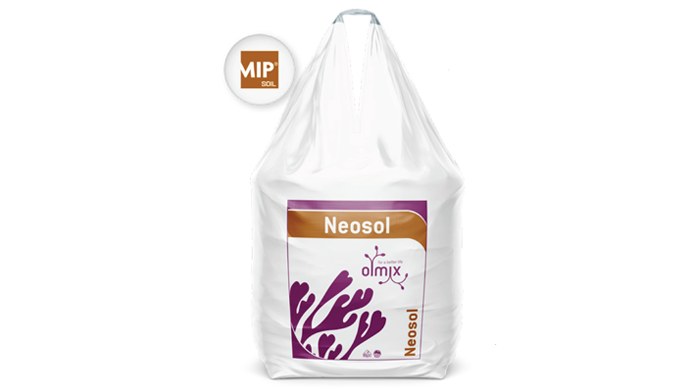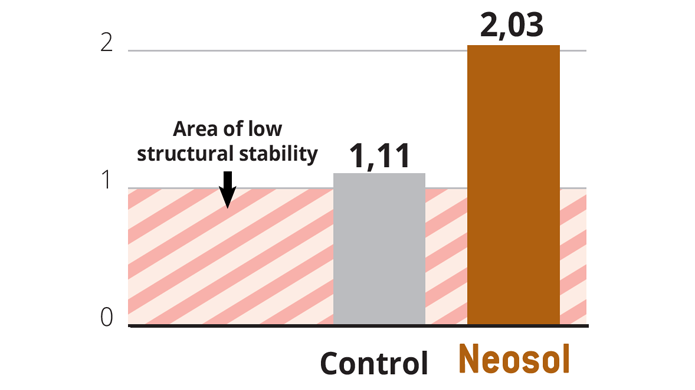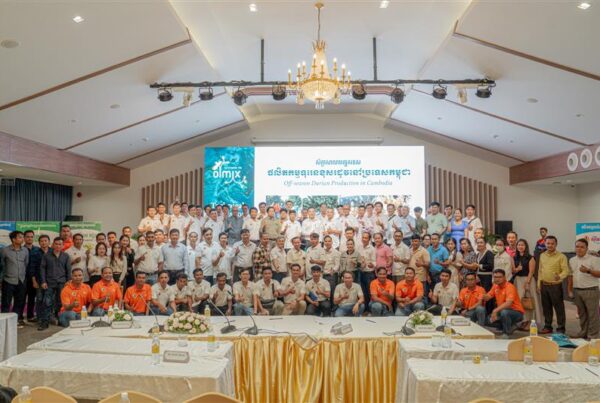The Agricultural Research Institute ZVT in Troubsko (Czech Republic) has conducted extensive scientific experiments for 3 years within the framework of the research project «Technologies for erosion control and soil protection» financed by the Czech Ministry of Agriculture. The work revealed significant changes in soil quality induced by the Neosol activator from Olmix Group.
Neosol improves soil fertility
Whether in field crops or in specialized crops, the maintenance of soil fertility is the first action to be taken to secure yields. Any neglect of the soil can cause dysfunctions (decrease in biodiversity, loss of humus, compaction, capping, erosion…) and result in crop nutrition problems, an increase in their sensitivity to water stress, difficulties with the soil tillage, and losses of yield and income for the f armer.
Neosol remedies soil dysfunctions by promoting the formation of clay-humus complex and microporosity. It improves the circulation of water and air as well as the soil’s bearing capacity.
Neosol provides soil microorganisms with the essential elements for the proper functioning of their enzymes thanks to its MIP® SOIL trace element complex. Neosol thus stimulates the natural humification mechanisms of organic matter (crop
residues, manures, composts…).
Applied after the harvest, Neosol granules stimulate the biological activity of the soil in order to reach an optimal functioning.

”By incorporating Neosol into technical itineraries, farmers reduce tillage time, make full use of fertilizer inputs, and achieve consistent yields by reducing the impact of climatic ups and downs, all with positive environmental effects.
Soils that are more resistant to disturbances
In a context of global climate change, the succession of intense rainfall and drought episodes is becoming increasingly marked. The capacity of soils to bear the impact of these brutal variations on crops is becoming a highly sought-after quality, as it directly affects yield.
At a depth of up to 40 cm, the bulk density of the soil was reduced by 11.7%, the porosity of the soil increased by 14.6%.
Soils that are more resistant to compaction and able to store more water To assess the impact of Neosol on structural quality, scientists calculated the structure coefficient. This is the ratio between aggregates of good agronomic value (0.25 to 10.00 mm) and those of lesser value (> 10.00 and < 0.25 mm). The higher the value, the better the soil structure and the lower the risk of undesirable compaction. Values less than 1 indicate poor structural stability.
Soils that are more resistant to compaction and able to store more water
To assess the impact of Neosol on structural quality, scientists calculated the structure coefficient. This is the ratio between aggregates of good agronomic value (0.25 to 10.00 mm) and those of lesser value (> 10.00 and < 0.25 mm). The higher the value, the better the soil structure and the lower the risk of undesirable compaction. Values less than 1 indicate poor structural stability.
Neosol also increases the capacity of soils to absorb and store water for the benefit of crops. «In the field experiment, measurements of bulk density, porosity and actual soil moisture show a clear trend of 314% increase in the soil’s capacity to store of the soil to store more rainwater,» says engineer Ivana Šindelková of the ZVT research institute.

Soil structure coefficient
”The global climatic development follows the same trend in Europe, i.e. increasingly marked alternations between periods of excess water and drought. In this context, Olmix Plant Care relies on the proven properties of its Neosol fertility activator to provide farmers with an effective tool to produce more and better, by accompanying the essential changes in production methods in the face of the agricultural challenges described in the European Commission’s «Farm to Fork» plan.
In the pedoclimatic context of a rather dry region such as the one where this study was carried out, the average increase in yield measured over 3 years with the application of Neosol is 17.4% compared to the control.
Soil, a major issue at the european level
In Europe, nearly 20% of soils are subject to erosion with an average loss of 3 t of soil/ha/year in large-scale farming (knowing that the average rate of soil formation is about 1 t/ha/year). (Source GIS sol)
In 50 years, field crops have lost 30% of their earthworm diversity (Source INRAE). 45% of European soils have a deficit in organic matter with insufficient biological activity.
The area of compacted soils is estimated at 33 million hectares in Europe. In addition to a decrease in production, this situation also increases the risk of nitrate leaching and the emission of nitrous oxide (N2O, a greenhouse gas).
The cost of soil degradation is estimated at 10 billion euros per year.
The Olmix group specializes in the development of technological solutions to support its partners in the agricultural sector in the ecological transition of breeding and cultivation methods in order to reduce the use of inputs from synthetic chemistry.
In the field of plant production, the Integrated Plant Care Management approach developed by Olmix Plant Care aims to develop complementary biosolutions, the objective being to sustainably improve the 3 key factors of production:
- The development of soil fertility and the strengthening of its resilience;
- Improving the capacity of plants to obtain water and minerals;
- The reinforcement of the resistance of the crops.
Olmix has sales of €155 million and has 14 industrial sites, including a biorefinery specializing in the processing of algae and 4 formulation plants for its Plant Care activity and 4 formulation plants for its Plant Care activity.




